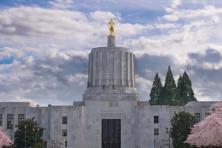OLYMPIA, WA- The 2024 WA legislative session is upon us, and this short session (ends March 7) will continue to keep climate as a high priority. There will be a continued focus on ensuring an affordable and effective transition to a clean transportation system and transitioning buildings to clean energy, as well as new legislation to protect Washington consumers and facilitate the transition of our gas system to clean energy.
Notably, 2024 begins against the backdrop of 2023's remarkable first year with the Climate Commitment Act program that generated a total revenue of $2.2 billion. CCA was without precedent in Washington in its opportunity to protect air, water, and forests from pollution, address environmental harm to communities of color and Tribal Nations, and provide historic levels of funding to create more resilient communities across Washington. Washington is a national leader in both its ambition to reduce carbon pollution and having an enormous infusion of funding to ensure the transition to clean energy is affordable and accessible.
This year's legislative work ultimately reflects the larger shift for climate action in Washington- with one of the strongest policy frameworks in the country committing us to transition away from fossil fuels in our grid, transportation fuels, and economywide, we can now focus on how we reduce emissions and who will benefit from the transition.
CLEAN TRANSPORTATION
100% Clean School Buses (HB 1368) + $60.5m in CCA funding
*Environmental Priorities Coalition Priority
All schoolkids should be able to get a healthy and safe ride to school. Diesel pollution causes cancer, contributes to lung and other chronic diseases, and triggers asthma attacks. Yet almost all of our 12,000+ school buses in Washington currently run on diesel. The pollution from these buses is especially harmful to kids with still-developing lungs. In fact, the air pollution inside a school bus can be 4 to 12 times higher than outside. Children from low-income families and with medical conditions are more likely to take the bus to school, exacerbating existing health disparities and making local air quality worse. We can and must change this to protect kids and our communities.
HB 1368 can ensure all Washington kids have access to a clean and healthy ride to school by requiring all new school buses to be zero-emission by 2027 and all school buses on the road be zero-emission by 2035. The Legislature must also financially support schools in this transition.
Hold Oil Companies Accountable
*Environmental Priorities Coalition Priority
While we struggled through the pandemic and inflation, oil companies pocketed historic profits of over $200 billion in 2022 alone. Not coincidentally, anyone filling their gas tank in Washington experienced the highest-ever gas prices that summer- the oil industry extracts some of its highest profits in the entire country from Washington. At the end of 2022 (notably the year before the Climate Commitment Act and the Clean Fuel Standard programs began), for every gallon of gas sold at the pump, retailers pulled a margin of 85.6 cents- on top of profits embedded in the price from oil refiners and producers.
This bill would require oil companies to be more transparent about their profits and prices so the state can ensure Washingtonians are not harmed by pricing malpractice as we transition to a clean economy.
2024 BUDGET PRIORITIES
Continuing to invest the Climate Commitment Act revenue wisely: 100% Clean School Buses and Multi-family Housing
2023 revenue raised by the landmark Climate Commitment Act (CCA) was close to $2 billion, creating a new funding stream for investments in climate, clean energy, and communities statewide. It is critical to spend dollars wisely and ensure an equitable transition to a carbon-free future- 2024 budget priorities are 100% clean school buses and retrofits for multi-family housing.
- We can fund the transition to zero-emission buses, help our schools, and improve our kids' health. With $60.5 million from the supplemental budget, the Washington Legislature can help meet the need and growing demand for clean buses and ensure all kids can get a healthy and safe ride to school.
- With affordable housing a top priority, we need to dedicate funding so residents of affordable, multi-family housing can reap the benefits of living in clean and healthy electric buildings. Low-income residents are the least able to transition off of gas, and for tenants of affordable, multi-family housing (MFH) it is largely up to building owners to make this transition. The Washington Legislature should invest $100 million in affordable MFH housing incentives for energy efficiency upgrades and electrification retrofits. This operating budget funding should be flexible and can be used for outreach, planning, and technical assistance.
NAVIGATING BUILDING ELECTRIFICATION BENEFITS & UTILITY PLANNING
Clean Buildings Navigator Bill (HB 1391)
With significant new clean energy incentives coming to Washingtonians from federal investments and the Climate Commitment Act, it is critical that the incentives are accessible, and understandable, and that there is significant community outreach and input. This bill would create a one-stop shop and outreach campaign to do just that.
Gas Utility Decarbonization (HB 1589)
This bill will ensure that PSE (our largest gas and electric utility) plans for the transition to clean energy, makes significant new programs available to help folks transition off of fossil gas, and creates opportunities for low-income people to access the clean energy transition. HB 1589 will require PSE to proactively plan to meet statutory requirements to decarbonize its system. Without this bill, PSE may continue planning its gas system to be reliant on fossil fuels indefinitely, resulting in stranded assets and higher costs for customers.
A NOTE ON POSSIBLE CLIMATE COMMITMENT ACT ROLLBACKS AND REPEAL
There is currently a possible initiative to the Legislature to repeal the Climate Commitment At (I-2117) as well as other policy proposals that would weaken the law. Proponents claim this initiative and other possible proposed policies would "fix" the CCA, but would actually take Washington backwards if passed, as a repeal would undo protections for our air, water, forests, and farmlands. Proponents are selling the repeal initiative and other rollbacks as a way to lower gas "taxes" when in fact, the oil industry sets gas prices high to bring in the highest possible profit. It's critical to highlight that a repeal of the CCA would lead to costly, unintended consequences for the state and our neighborhoods, and take away billions in revenue from the state to accelerate the transition away from fossil fuels and invest in our ability to mitigate climate impacts already being experienced by communities statewide.



